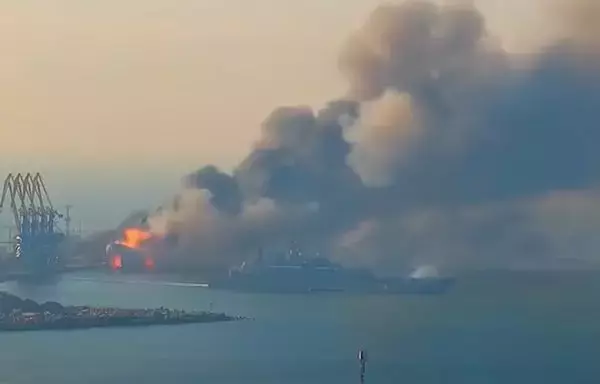Russia's allegedly vaunted naval prowess is being seriously questioned after more than a year of embarrassing losses in Ukraine, and as Moscow appears unable to execute its own naval doctrine.
Within the first few months of Russia's illegal invasion of Ukraine, the Russian Navy suffered two high-profile losses of warships.
On April 14, 2022, Ukrainian missiles sank the missile cruiser Moskva, the flagship of Russia's Black Sea Fleet, about 110km from Odesa.
Three weeks earlier, on March 24, 2022, a Ukrainian missile sank the Saratov, an Alligator-class tank landing ship (LST), in Berdyansk, Ukraine.
![A screenshot from a video posted on social media shows the damaged Russian warship Moskva about to sink in the Black Sea in April 2022. [File]](/ssc/images/2023/04/25/41847-moskva-600_384.webp)
![The Russian guided-missile cruiser Moskva, formerly known as the Slava, is shown in Sevastopol, Ukraine, in 2009. Ukrainian missiles sank it in the Black Sea in April 2022. [Courtesy of George Chemilevsky]](/ssc/images/2023/04/25/41848-sunk-600_384.webp)
The sinkings betrayed the Russian navy's inability to carry out the so-called Bastion Defence doctrine.
The term refers to a naval strategy that calls for a heavily defended area of water in which friendly naval forces can operate safely.
Dating back to Soviet times, the Kremlin sought to protect its prime military assets -- namely, its nuclear submarines -- by using the Bastion Defence, as outlined in 2020 by military scholar James Lacey.
Part of Lacey's definition of the defence is "geographic locations where A2-D2 [anti-access/area denial] capabilities are massed and integrated to defend valuable strategic assets".
Three Russian or Soviet naval bastions functioned: in the Barents Sea, for nuclear submarines; Kaliningrad, for any fighting in the Baltic states or Poland; and the Black Sea, which Moscow dreamed of turning into a "Russian lake".
As Soviet nuclear submarines manoeuvred within those spaces, "they were protected by approximately 75% of the Soviet navy's attack submarines, every surface vessel in its northern and Pacific fleets, and hundreds of aircraft", Lacey wrote.
The Bastion Defence doctrine has functioned as a bulwark for Russian military survivability since the Cold War.
Boasting debunked
The doctrine has since evolved for operational and strategic offensive purposes.
In the first weeks of the war, Russia's bastion in Crimea enabled its forces to make territorial gains in southern Ukraine, including seizing Kherson city, the North Crimean Canal and Snake Island, as reported by the Jamestown Foundation in April 2022.
Despite the bastion's purported A2-D2 capabilities, the Black Sea Fleet soon came under withering attack from a much smaller and worse-armed foe that turned to missiles and drones.
The destruction of the Saratov and the Moskva only weeks apart in 2022 exposed the hollowness of the Kremlin's much-repeated claims to possess the "second [best] army in the world".
It also demolished any Russian ambitions to dominate the Black Sea.
Whatever air defences Russia provided for its surface navy, they failed abjectly.
In fact, the Moskva crew had turned off its missile defence radars, either from laziness or incompetence, before the ship was hit, USNI News reported last May.
So great was the humiliation that Russia for weeks obfuscated the fate of the two vessels, even denying initially that the Moskva had sunk. After acknowledging the ship's loss, the Kremlin never released credible casualty totals for its crew.
It took a full year before it admitted losing the Saratov LST, which went down with 2,000 tonnes of military cargo. Casualties aboard that ship are undisclosed.
Panicked by the loss of the Moskva, the Black Sea Fleet abruptly withdrew from Ukrainian missile range, and its main mission became self-preservation.
After Ukrainian drones additionally hammered the fleet in Sevastopol, occupied Crimea, last October, satellite imagery showed the ships cowering in the port instead of operating in open water.
Any threat of invading Odesa is now gone, with the fleet too far away to conduct or support a landing.
Instead, the Russians have been reduced to firing missiles at apartment buildings.
Grieving families
The Russian navy's failures have meant the death of its sailors.
For the families of Russian seamen who perished in 2022, their loss will revive memories of how the Kremlin mishandled the sinking of the Kursk nuclear submarine in August 2000.
That sub sank in the Barents Sea, probably from an onboard explosion. Russian President Vladimir Putin stayed on vacation for almost a week and rejected offers of international rescue aid for five days.
Searchers later found that 23 sailors had survived the initial explosion and suffocated waiting for a rescue that never came.
That heartless attitude toward casualties has been evident throughout the Ukraine war. In mid-April 2022, distraught relatives had to investigate on their own what had happened to Moskva sailors, as the London Guardian reported at the time.
One mother found out on April 18, from a phone call by the Defence Ministry, that her son had died, after four days of official silence.
A cook's father received his son's death certificate only last August, according to Radio Free Europe/Radio Liberty.
That man and his wife, months before learning the cook's fate, roamed military hospitals in Russia and occupied Crimea looking for him. Many other families resorted to such measures trying in vain to find their sons.
Their cries for accountability have gone unheard.






